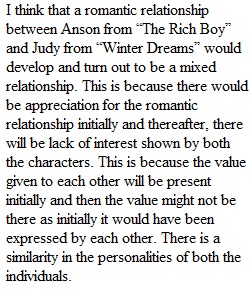


Q Select any two of the following questions and create two critical, thoughtful responses. When crafting your responses, be sure to note the title of the pieces you’re discussing. Use in-text citations from the readings to support your point of view. 1. Explain how self-creation, social status, and the idea of “success” inform the major theme of “Winter Dreams.” 2. What do you think Fitzgerald expects the reader to “learn” over the course of reading “Winter Dreams”? Do you think Dexter learns as much as the reader does? 3. Find and explicate a passage that you feel gives the best insight into Dexter’s character. 4. Trace how Fitzgerald reveals the character of Judy Jones over the course of the story. Comment in particular on how a dream-to-disillusion theme is central to the story. 5. Explain how in “The Rich Boy,” Anson’s main problem in life is having it “too easy.” Describe how privilege adversely affects his character. 6. Based on your understanding of their characters, explain how a romantic relationship between Anson from “The Rich Boy” and Judy from “Winter Dreams” would develop and turn out. 7. Explain why you think Fitzgerald chose to include the character of the narrator in “The Rich Boy.” What does narrator learn from his experience with Anson, and what does he understand that Anson might never come to realize? 8. Compare and contrast Fitzgerald and Hemingway’s depiction of key female characters. What are the strengths and limitations of each author’s various portrayals? 9. Fitzgerald once wrote that “the natural state of the sentient adult is a qualified unhappiness. I think also that in an adult the desire to be finer in grain than you are, ‘a constant striving’ (as those people say who gain their bread by saying it) only adds to this unhappiness in the end—that end that comes to our youth and hopes.” Explain how you see this view reflected in the particular actions and behaviors exhibited by various characters in “Crazy Sunday.” 10. Analyze and discuss Miles and Stella’s relationship. 11. In “Babylon Revisited,” Charlie cannot seem to escape his past. Discuss how the past invades the present in this story and how it affects Charlie’s life. Consider, as well, how Duncan and Lorraine are essential to the story. 12. Does Charlie get what he deserves at the end of the “Babylon Revisited”? Justify your answer based on a close analysis of his character. 13. What is the main psychological problem Fitzgerald is confronting in "The Crack-Up"? What important aspects of moving from youth to adulthood does Fitzgerald describe in this personal essay? 14. In "The Crack-Up," Fitzgerald writes: "So there was not an 'I' anymore - not a basis on which I could organize my self-respect - save my limitless capacity for toil that it seemed I possessed no more. It was strange to have no self..." What has happened to Fitzgerald's sense of self? How does Fitzgerald's depiction of the erasure of "self" relate to how today's social media-saturated culture can diminish or eradicate any sense of authentic selfhood?
View Related Questions